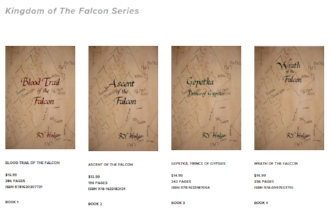Excerpt, Book 3
/Gepetka, Prince of Gypsies
The road ended. It was not that the road was
particularly a good one. In fact, it was rugged, steep,
and, in places, nearly indiscernible as a road. However,
its termination in the Swiss Alpine village was abrupt
and distinct.
The village consisted of a tight cluster of four dozen or
so thatched houses, with a tidy but substantial
complement of outbuildings, set up against the banks of
a swift mountain stream. A narrow footbridge crossed
the stream, and only goats were visible in the meadows
that swept up to the rugged peaks on the other side.
It was the end of the road, but certainly not the edge
of the earth as he had been assured to find. With only
the slightest hint of disappointment, the Gypsy surveyed
the picturesque surroundings. The view was nothing
short of awe-inspiring.
The light mountain breeze murmuring through the
tops of the pine forest carried the freshest, coolest air
the Gypsy tinker had ever breathed. Having heard
rumor of the remote village at the end of the earth, he
had impatiently sought an excuse to explore it. He had
toiled to the place under the auspices of breaking new
territory in which to ply his trade. The truth was, he was
innately curious, and made the journey purely for the
sake of discovery. Though it was not what he had hoped
to find, he was delighted.
The thirteenth century was giving way to the
fourteenth, and the traveling tinker did not want to be
left in the past. The exploration of new places, people,
and experiences kept him regularly trading in unfamiliar
territory. So it was nothing new when he coaxed his
donkey to back the cart to align nicely with the ten
other carts that were parked parallel to one another.
Their tailgates all neatly pointed toward the village, and
so did his. The Gypsy's cart was only distinguished from
the others by its brightly-colored paint job.
1
Noting that his donkey was the only one in sight, he
decided to leave her hitched to the cart rather than put
her in with the corralled oxen. He did not want the great
beasts to object to the interloper. Subconsciously, or
perhaps by experience, he also knew Gypsies were,
often as not, considered undesirable interlopers as well.
Satisfied with his cart arrangements, he began making
his way among the silent buildings. At that point the
weary Gypsy hoped to find a good meal and possibly
even some exotic nugget of truth. He had just begun to
wonder over the absence of inhabitants when the distant
cacophony of excited voices led him through the village
center. He wove around and between houses toward the
sound until he was suddenly at the edge of the open
square at the far end of the village. A stone building
much larger than the others stood across the crowded
square. He presumed it to be the church.
The sea of fair blond heads captivated his imagination.
The crowd was intent on something that was out of sight
to the Gypsy. Then a man stepped up onto some pedestal
and began making an accusation, gesturing angrily
toward a pole in the midst of the courtyard. The crowd
responded with equal enthusiasm as a woman was
thrust against the pole and bound. Bundles of dried
branches were piled waist deep about the woman and a
pail of melted tallow was sloshed over her and the
kindling.
The tall Gypsy's pleasure dissolved into revolting
horror. Quickly he turned to leave, but not soon enough.
The corner of his eye caught the motion of a hand
snatching the bonnet from the woman's head and a flash
of vivid red hair flowed into sight. Involuntarily he
looked back at the spectacle as a puff of wind whipped
the long flame red hair about the woman's face as if
prophesying her death.
He was momentarily transfixed by the proud, or
perhaps defiant, look on the woman's face. Her eyes met
his across the crowd and he felt as if she were
conveying some urgent message. His mind raced for
some kind of conclusion, but his ears only heard the
word “witch” chanted, then suddenly she was engulfed
2






